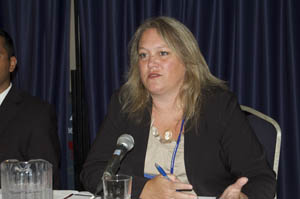
When it comes to compensation for chief legal counsel, some, such as Elisabeth Preston, CLO of Allen Vanguard Corp., suggested there is a growing trend of CLOs being paid on par with the chief financial officer.
“Part of the whole plan of being seen to be an equal around the executive table has a lot to do with pay and how you’re respected,” said Preston during a panel at the Canadian Corporate Counsel Association meeting, held in conjunction with the Canadian Bar Association annual meeting in Halifax this week.
“I have found in different companies and in talking to friends in similar positions that we all care about being paid the same as the CFO. The CFO in a public company is ‘the man’ and paid well. I think the chief legal officers really care about being seen as the other right-hand man to the CEO, which is the CFO. I think legal used to report to the CFO but I don’t think that happens as much anymore.”
However, Robert Hanf, CLO with Halifax-based energy company Emera Ltd., pointed out there are compliance responsibilities they must answer to such as Sarbanes Oxley that come with being CFO and CEO that do not apply to chief legal counsel.
“I would have a different view on worrying about whether you’re paid as much as the CFO or CEO. If you want to be paid as much as them then become a CFO or CEO,” said Hanf who has held the role of CEO in the past and has both given legal advice and received it.
“I can tell you it’s quite different. I think it’s fantastic if you can serve in a non-legal role for a period of time. It will change the quality of the service you deliver,” he said. “We talk about understanding the business, well, you will understand it if you are in it.”
If they want to expand their sphere of influence, make themselves more valuable, and make more money, in-house counsel need to approach their work more like business people and a little less like lawyers.
The panelists also discussed the ways they have become business partners and influencers in their organizations.
Hanf said there are 19 lawyers in the various Emera companies around the world and most of the lawyers are “embedded” in each of the business units. There is not a central legal services function.
“I’m not saying there is an optimum structure for success but not knowing what your structure should be would lead to failure,” said Hanf. “Focus on the strategy of the business as opposed to just delivering legal services.”
The president of each Emera business unit determines the goals for the in-house counsel in conjunction with Hanf. The employee has a balanced scorecard used to measure their success and development. Hanf and the president of the unit determine the goals for that person for the year. Their compensation is tied to those goals.
“I determine 50 per cent of whatever that person’s bonus is and the business unit leader determines the other half,” says Hanf. “People tend to pay attention to the process.”
There is also a “performance map” created for each lawyer that evaluates a number of factors including how they focus on the customer, how they work as a team player, achieve results, build relationships internally and externally, and what their commitment is to the success of the company.
“It may seem odd, but it’s tremendously important for alignment of the person’s goals and the company’s goals,” he said.

 When it comes to compensation for chief legal counsel, some, such as Elisabeth Preston, CLO of Allen Vanguard Corp., suggested there is a growing trend of CLOs being paid on par with the chief financial officer.
When it comes to compensation for chief legal counsel, some, such as Elisabeth Preston, CLO of Allen Vanguard Corp., suggested there is a growing trend of CLOs being paid on par with the chief financial officer.